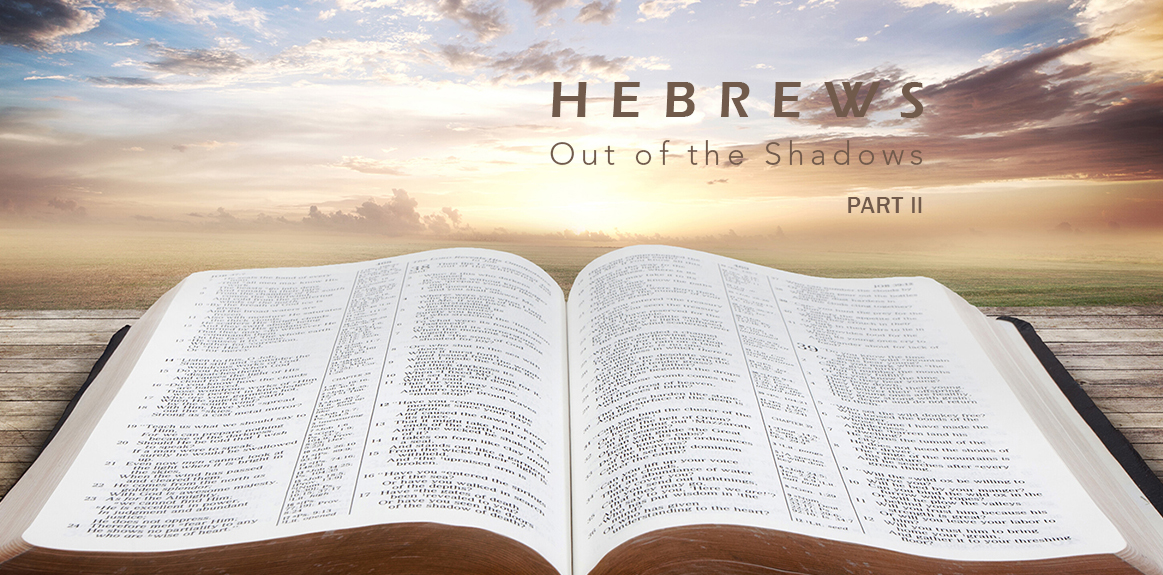In our continuing study of the letter to the Hebrews, we want to examine a key word that unlocks the door of understanding the central theme of the letter. It is the word shadow and appears in the verse that is before us:
“For since the law has but a shadow of the good things to come instead of the true form of these realities, it can never, by the same sacrifices that are continually offered every year, make perfect those who draw near.” Hebrews 10:1
The writer of Hebrews refers to the Law given to Israel through Moses as merely a shadow of the good things that were coming in Messiah Jesus. A shadow is a reflection of reality but is not reality itself. If I stand in the sunlight so that it casts my shadow on the sidewalk, it is possible for you to discern that it is me. The shadow though is not really me but is a reflection of my person.
That is exactly what the writer of Hebrews is saying about the Law God had given to Israel. It was shadowy in nature, being a reflection of the Substance. One can make out in it something of the nature of God, but it is not really clear. But the writer assures us that there are “good things to come” when Messiah makes his appearance. Then, the shadow will give place to the Substance. A Bible teacher I listened to as a new believer used the following illustration to describe the relationship between the Law and the New Covenant. He said that in the Old Testament, Israel was in the ‘doll-stage’ of religion. Women, when they are little, play with dolls. Why do little girls play with dolls? It is unconscious preparation for the day when they will trade in their dolls for the living baby. He went on to say that while Israel was playing with their dolls, the day came when God asked them to trade in their dolls for the Living Baby. What happened? They killed the Living Baby so they could go on playing with their dolls.
I once heard of a play about the life of Abraham Lincoln in which Lincoln never came on stage. Instead, he stood behind the curtain in such a way that the lights backstage cast his shadow over the entire stage. In each of the various acts, the main persons in his life; his family, his generals, his cabinet officers, came out on stage and stood in Lincoln’s shadow. But Lincoln remained backstage, only his shadow being perceived. Finally, in the last act, all of the other players leave the stage as Lincoln comes out from the curtain. He stood alone as the spotlight shined on him, everyone else having left the stage.
In many ways, this is a perfect illustration of the relationship between Jesus as the Substance, and all that came before him in the Old Testament. For centuries before him, Jesus cast his shadow on every personage and ritual God had ordained. Whether it was Abraham, Moses, David or the Old Testament sacrificial system (not to mention numerous prophecies scattered throughout the Hebrew Bible), they all pointed to the Messiah who was to come. All that came before him was a shadow of the good things to come.
But the day came when He stepped out from behind the curtain of history and took center stage. All of the previous personages and rituals now made sense. They were a mere shadow of the One to come and the shadow now gave way to the Substance. The spotlight was now fixed on Jesus of Nazareth, the One who is far better than any person or ritual that went before him.
The writer of Hebrews now takes the main components of the Hebrew religion and compares it to what has now come in Jesus. It is not that the things of the Old Covenant were bad and to be despised. In every way, the Hebrew religion was far superior from anything which could be found in Heathenism. But the writer of Hebrews is not comparing what has now come in Jesus to various aspects of heathen religion. Instead, he is comparing the Old Covenant to the New; that which God Himself had previously instituted under the old arrangement he had previously made. We must always remember the apostle Paul’s words that the “law is holy, and the commandment is holy and righteous and good” (Romans 7:12). The problem did not lie with the law but with the sinfulness of human beings. It called for an entirely new covenant designating a new way of approach.
In the remainder of the letter, the writer takes each component of Old Testament religion; the prophets, the angels, Moses, the land of Canaan, the Sabbath, the temple and the various Levitical offerings, and demonstrates that Jesus is much better than all of these things. They were shadows and he is the substance.
But this letter to the Hebrews is more than merely a doctrinal epistle—it contains a strong exhortation as well. If we read it merely as a letter written to Hebrew believers, we will miss its powerful application to our own lives. It is a word to us as well. That’s because we can be believers yet have a shadow type of Christian life. What I mean is we do certain things that are required, but they don’t seem real. Things seem to be quite shadowy. Even though we pray, it feels like it is little more than intimate fellowship with the ceiling. The shadow Christian life may be one that is very active, yet we are not partaking of the reality of which Scripture speaks.
Just as God was calling these Hebrews to leave the shadows and embrace the substance, so we also are called to leave the Christian shadowlands and embrace all the fullness which has come in Messiah Jesus.





0 Comments